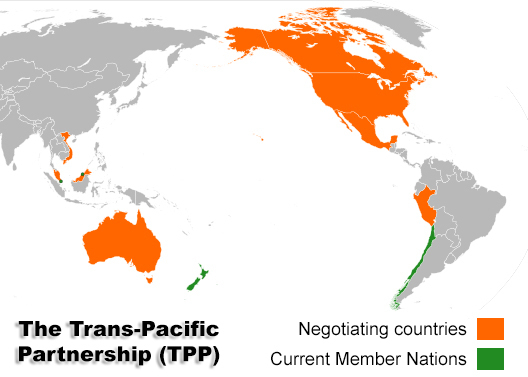The TPP's economic mission and ultimate aim
- By Zhang Jingwei
 0 Comment(s)
0 Comment(s) Print
Print E-mail China.org.cn, November 7, 2014
E-mail China.org.cn, November 7, 2014
It is hard to say that the world is welcoming an era of Asia. However, the economy of the Asia-Pacific region is the most active, and the geopolitical games are the most intensive. China and the United States, the big powers on the two sides of the Pacific Ocean, are reacting to each other geopolitically, although their economic interests are closely related.

The Asia-Pacific Economic Cooperation (APEC) summit is being held in Beijing. The Asian Infrastructure Investment Bank (AIIB) recently announced its establishment in Beijing. And the TPP held a new round of negotiations in Sydney on Oct.27, 2014. In all of the three events, especially the latter two, there is a strong sense of a struggle between China and the United States. The United States thinks the AIIB is not open and transparent; Japan said it will not invest; and Australia and the South Korea are hesitating, waiting for an indication from the United States. And China is absent from the TPP, and the 12 member countries, led by the United States, made progress in market access and trade and investment regulations.
The AIIB, 50 percent of which is held by China, will be in competition to a certain extent with the Western-dominated World Bank Group (WBG) and the Asian Development Bank (ADB). Of course, the United States and Japan will not be happy. At the same time, it is understandable that China is unhappy, as TPP, headed by the United States, is forming a new regional trade system that excludes China, the second economic power and the biggest goods trading country, showing an obvious intention to isolate China.
Besides, TPP also blocks the maritime power strategy that China is proposing. Therefore, TPP is not just a simple regional economic and trade system. It is a supplement to the U.S. re-balancing strategy in the Asia-Pacific Region. It is an economic measure of the United States in its geopolitical game towards China.
It is clear that, especially in the western Pacific region, China and the United States are playing the game between a traditional power and a newly-rising power. Based on their economic and trade intimacy, the two powers may avoid the historical curse where neither side gains whenever two powers are competing.






Go to Forum >>0 Comment(s)